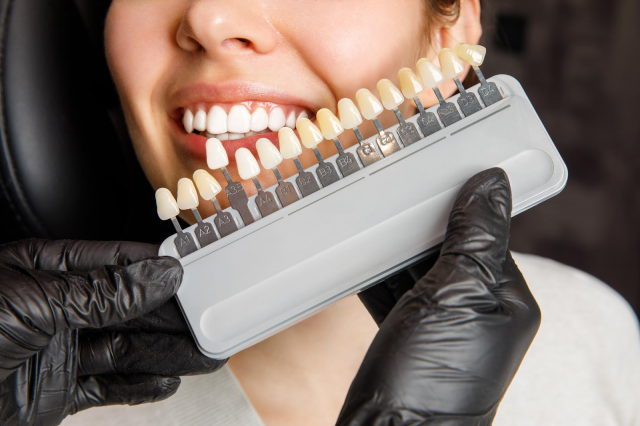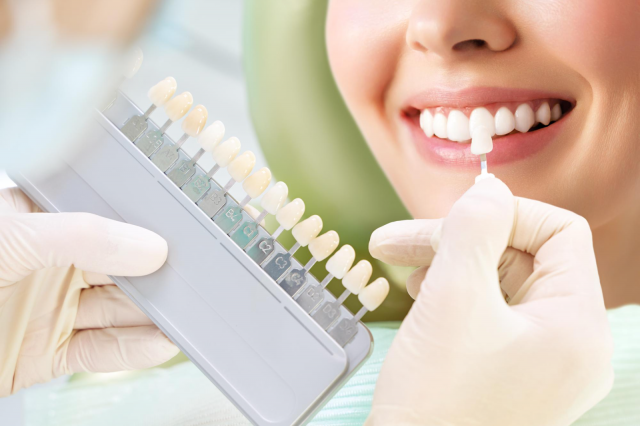What are dental veneers?
Dental veneers are thin, custom-made tooth coloured shells that are bonded to the front surface of teeth to improve their appearance. They are made from porcelain or composite resin materials and are designed to match the colour and shape of your natural teeth. Dental veneers provide a versatile solution for a problem like discolouration, chipping, gaps, or misaligned teeth.
How Do Veneers Work?
Veneers cover the front surfaces of your teeth. They work by hiding cosmetic flaws such as cracks, chips and stains.
(Source: Freepik.com)
Different Types of Dental Veneers
Porcelain Veneers
Porcelain veneers are the most popular type of material due to their durability, stain resistance and an ability to mimic the appearance of natural teeth.
Composite Veneers
Composite veneers are made from resin material that is directly applied and shaped by the dentist onto the teeth. Unlike porcelain veneers, composite veneers can be completed in a single dental visit, making them a quicker and more cost-effective option. However, they may not be as durable or stain-resistant as porcelain veneers.
Who needs dental veneers?
Dental veneers are suitable for someone who wants to enhance the appearance of their smile. These dental restoration can cover:
- Diastema
- Chipped
- Stains
- Broken teeth
- Misshapen teeth
- Replace old fillings
What are the benefits of dental veneers?
Dental veneers offer several benefits, including:
Improved appearance
Veneers can significantly enhance the appearance of your smile by covering up imperfections and creating a more uniform and aesthetically pleasing look.
Stain resistance
Porcelain veneers are highly resistant to staining, which means they can help maintain the whiteness of your teeth over time.
Durability
Veneers can last for 10 to 15 years with proper care, providing a long-lasting solution for cosmetic dental issues.
Conservation of tooth structure
Unlike other cosmetic dental procedures, veneers require minimal tooth preparation, which means less removal of tooth enamel.
What are the disadvantages of veneers?
It also comes with certain disadvantages. For example:
Loss of Natural Enamel
The process of applying veneers typically involves removing a layer of enamel from the teeth, which is irreversible and can compromise the natural structure of the teeth.
Irreversibility of Some Types of Veneers
Certain types of veneers, once applied, cannot be removed without causing damage to the teeth, making the process irreversible.
Increased Tooth Sensitivity
Following the application of veneers, some individuals may become more sensitive to temperature changes, particularly to hot and cold foods or drinks.
Risk of Veneer Dislodgement
There is a possibility that a veneer may loosen or come off over time, especially if it is subjected to excessive pressure or if the bonding material fails.
Limited Insurance Coverage
Since dental veneers are primarily considered a cosmetic procedure rather than a medically necessary one, they are typically not covered by standard dental insurance plans.
(Source: Freepik.com)
What is the procedure for getting dental veneers?
The process of getting dental veneers typically involves several steps:
Consultation
During your appointment, your dentist will assess your teeth and discuss your goals for the procedure.
Preparation
If you decide to proceed with veneers, your dentist will prepare your teeth by removing a small amount of enamel to make room for the veneers.
Impressions
Your dentist will take impressions of your teeth to create a custom mould for your veneers.
Temporary veneers
While your permanent veneers are being made, your dentist may fit you with temporary veneers to protect your teeth.
Final Touches
Once the permanent veneers are ready, your dentist will bond them to your teeth using a special adhesive.
Adjustments
Sometimes, a bit of tweaking is needed to make sure your veneers feel comfortable and look natural. Your dentist will take care of any final adjustments.
Follow-Up
After everything is done, your dentist might ask you to come back for a follow-up visit. They will make sure your veneers are working well and give you tips on how to take care of them.
Frequently Ask Questions (FAQ)
Veneers vs crowns: What is the difference?
Veneers and crowns are distinct dental treatments designed for different purposes:
Veneers:
- Thin shells, made of porcelain or composite resin.
- Applied to the front surface of teeth to enhance appearance.
- Used for cosmetic improvements like colour correction, reshaping, or closing gaps.
- Minimal tooth preparation required, conserving natural tooth structure.
- Suitable for minor cosmetic issues without significant structural damage.
Crowns:
- Tooth-shaped caps covering the entire visible portion of a tooth.
- Provide strength, protection, and restoration for damaged, weakened, or decayed teeth.
- Used for extensive damage, large fillings, fractures, or after root canal treatment.
- Involves substantial tooth structure removal for fitting.
- Versatile, addressing both cosmetic and functional concerns, offering durability and support.
Dental veneers focus on cosmetic enhancements with minimal tooth alteration, while crowns offer comprehensive restoration and reinforcement for more severe dental issues.
Are veneers permanent?
Dental veneers are not considered permanent, but they are long-lasting with proper care. Veneers typically last for many years, often ranging from 10 to 15 years or even longer. However, over time, they may need to be replaced due to wear and tear, changes in the mouth, or damage. It is essential to follow good oral hygiene practices and visit your dentist regularly for check-ups to ensure the longevity of your veneers.
Do veneers damage your teeth?
Dental veneers typically do not damage your teeth if placed correctly. A small amount of enamel may be removed, but it is minimal. Sensitivity might occur temporarily. Decay risk remains if oral hygiene is neglected. Veneers can chip or crack if mistreated. Overall, they are safe and effective for improving smiles when maintained properly.
Do dental veneers require special care?
Yes, dental veneers require regular oral hygiene, avoiding excessive force, and minimizing exposure to staining agents. Regular dental check-ups are also important for monitoring their condition.
How can I keep my veneers in good condition?
Keeping your veneers in good condition involves regular care and maintenance to ensure their longevity and appearance. Here are some tips to help you maintain your veneers:
Oral hygiene: Brush and floss regularly with non-abrasive products.
Avoid staining: Limit foods and drinks that can stain, like coffee or red wine.
Use mouthguards: Protect veneers during sports or teeth grinding.
Regular dental visits: Ensure proper maintenance and address issues early.
Avoid using teeth as tools: Never use your teeth as tools (opening packages or tearing off clothing tags)
Following these steps will help preserve your veneers for a long time.
Conclusion
Dental veneers are a popular and effective way to improve the appearance of your teeth. They offer several benefits, including improved aesthetics, stain resistance, durability, and minimal tooth preparation. If you are considering veneers, it is essential to consult with a dentist to determine if they are the right choice for you.
For expert dental care and personalised treatment options, feel free to contact us!








